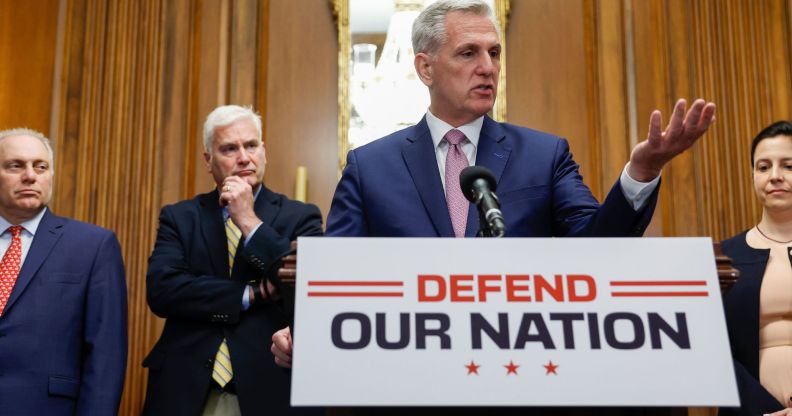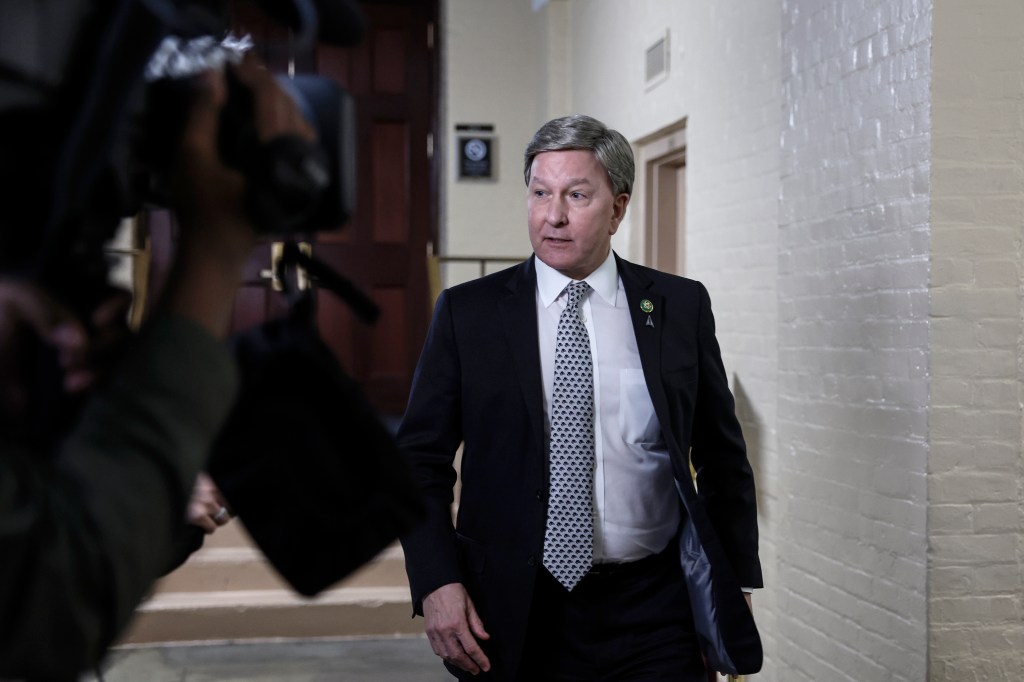Human rights groups slam far-right anti-LGBTQ+ defence budget amendments after House vote

Kevin McCarthy has been ousted as House Speaker in a historical first for the US. (Getty)
LGBTQ+ charities and human rights organisations have condemned amendments to an annual US national defence bill targeting trans military personnel and their families.
Republican-introduced amendments reflecting so-called ‘culture war’ battle lines for the National Defence Authorisation Act (NDAA) passed the first hurdle in the House of Representatives on Friday (14 July), with a vote of 219-210.
The NDAA for the fiscal year 2024 is the latest budgetary bill for the US military that is typically issued each fiscal year. It has a long history of bipartisan support, but Friday saw a marked departure from the past 60 years of cross-party collaboration due to the inclusion of a number of controversial amends that target reproductive rights and service members who are LGBTQ+ or people of colour.
Republican House Speaker Kevin McCarthy allowed the amends on a range of far-right policy lines from a group of conservatives, after they threatened to block a vote on the NDAA.
The amendments include denying healthcare coverage for gender-affirming care for trans service members and their families, banning the Defence Department from paying or reimbursing travel expenses related to abortion care for service members, and prohibiting the display of “unauthorised flags” – which would essentially ban the Pride flag from being flown.
A number of amendments focus on watering down protections against race discrimination in the military and gutting efforts to understand America’s history of racism. One (House amendment 235) will see the elimination of diversity, equity and inclusion offices and personnel in the Armed Forces and Department of Defence.
Republican Mike Rogers, the bill’s sponsor, thanked Republican lawmakers for supporting the controversial NDAA, as well as Republican House majority whip Tom Emmers.
Four Republicans voted against the bill: Andy Biggs of Arizona, Ken Buck of Colorado, Eli Crane of Arizona and Thomas Massie of Kentucky.

The National Defence Authorisation Act still needs to pass through both the Senate and President Joe Biden for approval to be implemented. If it fails, it will be the first time an NDAA bill has not been passed by Congress in six decades.
It is likely that a similarly partisan vote will take place in the upcoming Senate vote. The bill is being touted as ‘dead on arrival’ thanks to a 51-49 Democratic majority.
Republicans told to stop ‘peddling their extremist agenda’
Nonprofit advocacy groups, activists and allies across the US were vocal in their condemnation of the bill and those voting for it, which included four Democrats.
The Human Rights Campaign (HRC) criticised McCarthy’s decision to allow the amendments, which would ban “medically necessary” healthcare for trans military personnel and their families.
The HRC argued that House Republicans need to stop “peddling their extremist agenda” and threatening the well-being of LGBTQ+ and marginalised groups.
Similarly, the American Civil Liberties Union (ACLU) said that it believed Congress should be “a defender of liberty and the Constitution” but instead that Republicans were “hijacking the nation’s defence budget” to attack marginalised groups.
The ACLU also condemned supporters of the bill for seeking to “undermine” racial discrimination protections.
Independent journalist Erin Reed noted on Twitter that the amendments are on “must pass legislation” and that its failure could risk significant shutdowns of military funds.
“Do Democrats refuse to pass bills with these provisions in it and likewise see those shutdowns?” Reed asked. “Would Biden veto a bill and risk a shutdown? This could be devastating nationally. National funding ban.”
In a statement earlier this week, House Democratic Leader Hakeem Jeffries, caucus chair Pete Aguilar, and whip Katherine Clark condemned “extreme MAGA Republicans” for choosing to “hijack the historically bipartisan National Defence Authorisation Act to continue attacking reproductive freedom and jamming their right-wing ideology down the throats of the American people”.
They wrote: “House Republicans have turned what should be a meaningful investment in our men and women in uniform into an extreme and reckless legislative joyride.”
Among those to be appointed to the House-Senate conference committee to negotiate the compromise is notorious far-right representative Marjorie Taylor Greene of the hardline US House Freedom caucus, who told CNN that she believes its an “important opportunity”.
Initially, Greene said she would vote against the bill over its support for the war in Ukraine, but instead voted for it.
When asked whether she voted for the bill because of her appointment to the committee, she said: “I have the opportunity to do what I continue to do this week, and I want that opportunity.
“I think that’s an important opportunity for me to represent … The people all over America that do not want their tax dollars on an NDAA that funds a foreign war.”
Senate debate on the NDAA is set to begin on Tuesday (18 July) and a vote will take place later this month.
How did this story make you feel?

